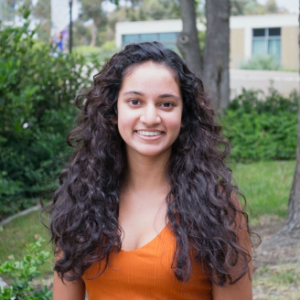Name: Jasmin Revanna
Hometown: Birmingham, AL
Lab: Laboratory of Genetics of Dr. Rusty Gage
Lab websites: https://gage.salk.edu/
Hobbies: dancing, dog parks, running
What do you study?
Before coming to San Diego for graduate school, I worked on making tools to change gene expression levels – essentially to turn genes on and off. The purpose of these tools is the understand what certain genes do. I am now interested in studying Alzheimer’s disease, a brain disorder that slowly destroys memory and thinking skills, and, eventually, the ability to carry out simple tasks. I specifically want to see if microglia, a helper cell in the brain, is contributing to the symptoms of Alzheimer’s.
Why is it important?
I personally am very interested in studying Alzheimer’s after learning how many people are affected by this disease. This disorder can be so damaging to someone’s life and I want to conduct research that could possibly help these people. But not only does it affect the individual themselves, but their friends and family, too. I started volunteering at Alzheimer’s San Diego which has helped me understand the impacts it has on interpersonal relationships. Alzheimer’s is not very well understood and I want to contribute to the field to get to the bottom of the cause.
How did you become interested in science?
My passion for science ultimately stems from my compassion for other people. I want to do something that will help people live better lives, and for me, that is by doing research that can be translated into therapies.
What do you like about being a scientist?
To be a scientist means you are answering questions that have not been answered before. You get to design the experiments to ask the question you are interested in and that is so cool to me.
What are 5 general vocabulary terms someone should know going into your field of science?
glia, stem cell, neuron, Alzheimer’s, dementia
What are 5 specific vocabulary terms someone should know about your research?
iPSC (induced pluripotent stem cell), microglia, reprogramming, organoids, RNAseq

